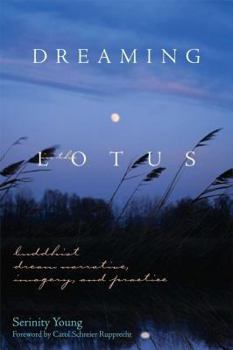Dreaming in the Lotus: Buddhist Dream Narrative, Imagery & Practice
Select Format
Select Condition 
Book Overview
Surveys the complex history of Buddhist dream experience and analysis. This description may be from another edition of this product.
Format:Paperback
Language:English
ISBN:0861711580
ISBN13:9780861711581
Release Date:October 1995
Publisher:Wisdom Publications
Length:320 Pages
Weight:1.05 lbs.
Dimensions:0.8" x 6.1" x 9.0"
Related Subjects
Buddhism Cultural Religion Religion & Spirituality Social Science Social Sciences SpiritualityCustomer Reviews
3 ratings
You won't find a better book in this genre
Published by Thriftbooks.com User , 15 years ago
I've long been obsessed with both how our dreaming mind functions and Buddhism's take on how the human mind functions. I've read a lot on both topics and I can say with confidence that nowhere is there a book that is more informative about the nexus of these two worlds than Dreaming the Lotus. Most books in this genre focus on Tibetan Dream Yoga, a Vajrayana tradition but Serinity Young delves into the Therevada and Mahayana traditions as well, citing texts from all three schools and how they have all used dreams as metaphors for illusion and enlightenment, as examples of prophetic experiences, auspicious events and much more. It's a fascinating read for people interested in history, dreaming, or Buddhism.
Not bad at all
Published by Thriftbooks.com User , 22 years ago
This is a book that I have on many an occasion wished to read, and the other day I finally picked it up from the half-priced book store, and finished it in two days. Young's historical view of Buddhist dreaming theory is well documented and for the most part objective. Firstly, dreams are viewed as a means to the end of ontological insight that brings one to the realization of shunyata-emptiness. Both dreaming and waking function on the same Apollian level where entities exist only as mental constructs devoid of self inherent essence. In early Indian Buddhism dreams play a large role in the life stories of the Buddha himself and other saints. Buddhist dream theory, like Buddhism itself emerged from and proceeded to distinguish itself from Brahmanical tradition. Buddha is said to have interpreted many macabre nightmares and visions in a new light of benevolence and good fortune. This brings me to the next point that in Buddhism, as in virtually all ancient systems of thought, dreams are regarded as containing prophetic value and foresight pertaining to experiences that will evince in the future. The book acknowledges several times the Asian belief that a dream is not HAD but SEEN i.e. stems externally rather than internally and thus a divine or demonic agent bestows the experience over one's sleeping state. There is also a unique interpretation of dream symbols and archetypes, especially so in Tibetan Buddhism. (which also has its own ritual dream yoga) Unfortunately, as evidenced in their symbolic musings there is a sign that even the peaceful and loving religion of the Buddha has in its history inferiority imposed on females. Some of the objects of intense study are how dream theory manifested itself in Tibetan Buddhism, Milarepa, and the Jatakas. It is my opinion however that, for the modern Buddhist, however important dreams may be not all of the ancient thought on them should be retained because some of it is mere imaginative superstition. (but I guess that goes for all religion) I guess I'm just thinking in terms of modern dreamwork where meaning tends to be more so than not individualized. Not only that but many of the symbols and their respective interpretations arose from and were dependent on the cultural context from which Buddhism arose. Basically all I'm saying is that I wouldn't ritualize in order to appease any deity after a bad dream. (But I'm also not saying that the book tried to argue in favor of this, just sharing an opinion of my own)
Best book on Buddhist Dreaming
Published by Thriftbooks.com User , 23 years ago
This is the best book available on the subject of dreaming in the Buddhist tradition. The author is intimately familiar with the languages, the cultures, and the multi-layered symbolic meanings of the dreams she discusses. Serinity Young offers fascinating accounts of the important roles that dreams have played in the lives of Buddhist teachers and mystics. She has especially intriguing things to say about the role of gender in dreaming. The issue of lucid dreaming comes up, but not in the way many Westerners might expect; Young argues persuasively that in the Buddhist context lucid dreaming (i.e., cultivating conscious awareness within the dream state) is a valuable means to the greater end of enlightenment. Dreaming in the Lotus is not a "how-to" book, but rather a stimulating invitation to learn about the dream traditions of another culture.






